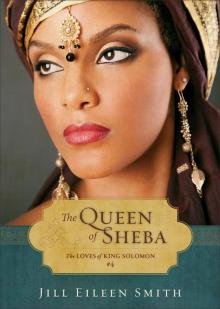- Home
- Jill Eileen Smith
Redeeming Grace: Ruth's Story Page 4
Redeeming Grace: Ruth's Story Read online
Page 4
“As ready as we can be, I suppose.” She saw his foot tap and the anxious way he kept glancing toward the city gate.
“Then let’s go. We said our goodbyes this whole past week. We must get started or it will take us longer than the five days I’ve planned for this trip.” He turned away from her and took hold of the donkey’s reins, tugging the animal forward.
Mahlon and Chilion walked beside the cart while Naomi followed on the opposite side behind her husband. Why did it have to come to this? The famine had taken its toll. She understood that. But she still agreed with Boaz. The land had produced some grain. Enough to survive, though not enough to rejoice in. Still, no one else felt the need to abandon his or her home. Why did Elimelech think it so necessary to flee the land God had given to them and go to a foreign place they did not know?
The sun crested the rise now, its morning hues of pink and pale yellow amidst a cloudless sky promising a warm day, probably steaming hot by the time it reached the midpoint. They were right to get an early start and walk as far as they could.
But as they passed the merchants who were just now beginning to open their shops, and the women moving ahead of them through the open gate to gather water from the well, Naomi fought the sting of tears.
She lifted her head and smiled and waved at the women. “Peace be with you,” she called to those closest.
“God be with you,” they returned in kind.
“Return to us safely and soon,” another said.
Naomi nodded, smiling still, though the expression felt frozen in place. The gates loomed ahead, and she caught sight of Melek and his wives and Boaz and Adi waiting. In the three years since their son’s loss, Adi had not conceived, but she did not look as wan and weak as she had back then. In time she would be the Adi Naomi had known so well. If only Naomi could stay to see the changes, to give Adi continued hope.
Elimelech stopped the donkey and embraced each man one last time, while Naomi clung to each sister-in-law.
“We will miss you,” Neta said softly against her ear.
“Hurry back,” Boaz’s sisters said, hurrying to join them, weeping.
“I wish you wouldn’t go,” Adi said, coming last. “Boaz is sure the famine will lift soon.” She held Naomi in a warm embrace as though she had no desire to release her.
“I hope he is right.” Naomi longed to reassure her, unwilling to repeat Elimelech’s comments of the night before against that very thought. Of course Boaz couldn’t know for sure, but he could hope. Only God could control the way the wind blew or when the rains fell—even in Moab. But God had been silent during their many prayers, and still the rains remained in the clouds.
Elimelech moved into her line of sight and motioned for her to come. She nodded and gave Adi one last reassuring squeeze, then turned to follow her small family through the gates of Bethlehem and into a world she did not know.
6
Five Days Later
The marketplace in Dibon teemed with people, not just those from the city and surrounding homes, but travelers—a caravan that had come a great distance.
Ruth met Orpah at the designated spot near the old weaver’s tent where a toothless, plump woman sat at a loom from the break of dawn until the sun dipped out of sight. At times, when Ruth had left to escape the stifling atmosphere of her mother’s house, she had wandered near enough to this booth to hear the loom still at work, dark though it was. Once, she had risked speaking to the woman and discovered she was nearly blind and wove her beautiful patterns by the feel of the threads. It was a skill Ruth thought impossible to master, but somehow the old woman knew. Even when unkind boys tried to switch the baskets on her, she still knew.
“There you are.” Orpah sidled up to her, pulling her from the memories. “Have you ever seen the town so full of people?” She glanced around, her gaze resting on the foreign caravan. “They say they have come from Bashan. Do you know how far that is?”
Ruth shook her head. “I know it’s beyond Ammon to the north, as far as birds fly in a day.”
“Longer than a day. It took weeks for them to weave through the foothills.” Orpah drew in a quick breath. “There are some Israelites among them,” she whispered, leaning close to Ruth’s ear.
“Israelites? What would they want with Moab? We have been enemies for years.” She followed Orpah’s gaze, searching. At last she spotted them. Three men noticeably stood out with their long beards and the tassels with one blue thread on each corner of their garments. One woman kept close to them, her head covered in a simple scarf, her striped robe dusty from travel.
“We should offer them shelter.” Ruth spoke before thinking through her words.
Orpah looked at her, aghast. “You can’t be serious. Where exactly would you put them? In the room with your mother or sister? Or would you share your bed with the whole lot of them?” She gave Ruth a look that revealed how ridiculous her thoughts were.
“No, of course we can’t do such a thing.” She sighed, longing to do something. “The woman looks so lost and tired.” Empathy filled her, despite the fact that they were from Israel. “Surely someone in town has enough room for them.”
“How do you know they are even here to stay? If they are passing through, let them sleep in tents outside the village walls, as their people have done for generations.” Orpah crossed her arms over her chest and glanced from the Israelites to Ruth. A moment passed between them in silence, then Orpah turned back and took a longer look at the small group. “The younger men are good to look upon,” she said softly. “They appear to be a single family.”
She took Ruth’s hand and dragged her slowly closer to the caravan. Donkeys pulling carts and camels piled high with wares filled the narrow streets. “The Bashanites are apparently here to trade,” Orpah said, looking on some of those wares with appreciation.
Ruth pulled Orpah to a stop several paces from the Israelite family. She leaned close to her friend. “We can’t just go and speak to them.”
“Why not?”
“It would be unseemly.”
“We could talk to the woman.” Orpah tugged her closer again, but Ruth refused to budge.
“What are we supposed to say?” She had never spoken to an Israelite, but she had heard of the way their judge Ehud had killed Moab’s King Eglon. She remembered enough of the loss of her father to have a sound dislike for the whole lot of them.
“We will ask them why they are here,” Orpah said in a matter-of-fact tone. “They are probably just passing through, but don’t you find it curious that they have the courage to come here at all?” She glanced at one of the young men. “Isn’t he handsome?” She released a sigh, which made Ruth laugh.
“You are impossible.” Ruth sized up the small group, saw the older man look over the town as if he were seeking something in particular—or someone. Moments later, Governor Aali himself entered the square and came up to the man.
Ruth glanced at Orpah and the two moved closer. It was impolite to listen in, but perhaps Orpah was right—it would be a good thing to welcome the woman. Ruth led the way, slowly at first, then lifted her head in confidence.
She stopped an arm’s length from the woman. “Peace be with you,” she said, catching the woman’s eye. “I am Ruth and this is Orpah. Welcome to Dibon.”
The woman looked at Ruth first, then met Orpah’s gaze and offered them a genuine, relieved smile. “Thank you,” she said, her voice soft, kind. “I am Naomi from Bethlehem Ephrathah.” She raised a hand toward the men, who were caught up in a serious conversation with the governor. “These are my sons and my husband.”
Ruth nodded, searching her mind for something more to say, for she was suddenly at a loss for words. One of Naomi’s sons glanced her way in that moment, and his smile caused a hitch in her breath. Orpah was right. They were comely men.
Her cheeks heated at that thought. She turned her attention back to Naomi. “Are you here to visit someone?”
Naomi’s slight grimace made Ruth wonder
if their reasons for being here were painful.
“We have come to escape the famine in Israel, and we hope to work the land as gleaners and perhaps rent land to plant crops of our own. My husband sent ahead to your governor and has met him a few times in years past when he came to glean with my oldest son.” She spoke quickly, and Ruth thought again that the woman must harbor painful reminders of some great loss. But then, leaving your home for a foreign land would be loss enough.
“So you plan to stay awhile,” Orpah said, extending an arm in an encompassing gesture. “Our town will surely be happy to have you.” She smiled at Naomi, as did Ruth, trying to put the woman at ease, though she doubted the truth of Orpah’s words.
“I plan to stay only as long as my husband fears the famine in Bethlehem,” Naomi said softly. “But I thank you for your kindness. I feared you would not welcome strangers such as us.” She glanced toward the merchants’ shops, and her gaze turned the length of the town square. “I know Moab and Israel have not always been on friendly terms.”
Ruth nodded, then placed a comforting hand on the woman’s shoulder. “And yet we are related, are we not? For Abraham is your father and Lot is ours, and they were uncle and nephew. Surely we can overlook any past differences.” But the words sounded false to her own ears even as she said them. Could she forget the war enough to welcome the very foreigners who had changed her life forever? Could the town as easily forget?
“Yes. We are related,” Naomi said, her eyes brightening. “I do hope the women of your village are as kind as both of you.” She smiled at each of them, and in that moment Ruth thought her beautiful. Perhaps she could overlook the past for one lonely family.
“We will be happy to go with you to make the acquaintance of the other women,” Ruth promised, glancing at Orpah, who confirmed her words with a firm nod. “When your husband has finished his business with the governor and you are settled, we will show you around.”
Naomi’s husband called her away then, and they parted soon after with the promise to meet again the following day.
“I hope she brings those two sons of hers with her,” Orpah whispered once the woman was out of their hearing. She giggled, and Ruth rolled her eyes as they walked along the path where the caravan masters were unloading their wares.
“You’re impossible.” But Ruth could not help wondering if the son she had noticed was as kind as the mother.
Naomi slammed the last tent peg into the earth, straightened, and rubbed the small of her back. They had brought only two tents with them, one for her sons and one for herself and Elimelech. She had dearly hoped they would not have need of more, as they would if her sons married—Oh Adonai, please don’t let it be so in this foreign place—for if she had her way they would soon return to Bethlehem, despite their currently landless state.
Why had they come?
A sigh escaped her as she surveyed the field outside of Dibon where the governor of the town had given them leave to set up camp. Elimelech would work out the details of their stay over the next week, but in the meantime, the governor seemed hospitable enough. At least enough to please Elimelech.
She carried the mallet into the tent and set it in a basket that held a few extra wooden pegs, then surveyed the small room. One partition separated their sleeping area from a sitting area. She set about placing a few rugs and cushions on the floor and carried their bedrolls to the other side of the curtain. How she missed Ziva and Adi and Neta! To have other women to help, to talk to . . . but no. She had her family, and that was all that mattered. And they would want to eat soon.
She picked up one of the water jars and left the tent. The city was fortified and had cisterns attached to many homes within its walls. Only when the cisterns ran dry would the women travel to the Arnon or one of the tributaries to draw water. Naomi sighed. It would be difficult to make the acquaintance of these foreign women, despite the friendliness of the two young women at the market yesterday.
It doesn’t matter, she told herself for the tenth time that morning. She would adjust. That’s what women did. They accepted the changes life brought their way and continued on as they’d always done.
The thought did little to comfort, but she stiffened her back and walked, head held high, toward the Arnon.
“Do you want me to go with you, Ima?” Chilion’s voice from behind caused her to turn and smile at her youngest son. “I can carry another jar so you don’t have to make the trip twice.”
She nearly scoffed at the thought of a man carrying water, then paused. “I would enjoy your company, if your father doesn’t have need of you.”
“Father returned to town with Mahlon.” He shrugged when she lifted a brow and gave him a scrutinizing look.
“He said nothing to me of this.” But Elimelech often did things without telling her. Perhaps he did not wish to endure her questions or disagreements with his choices. Lately, the slightest question sparked the greatest irritation in him.
“He returned to have a look around the town, meet the merchants, reacquaint himself with some of the men whose fields he worked last year.” Chilion lifted the jar from outside his mother’s tent and carried it between both arms.
Naomi nearly laughed at the sight he made with the large jug sticking out in front of him. She lifted hers to her shoulder and held it with one hand, but Chilion did not follow her lead.
“What else has your father told you?” That he has failed to tell me. But she held her tongue. Better not to antagonize the boy. Her sons had enough trouble with their father without her adding to their misery.
Chilion fell into step with her, eventually shifting the jug to his shoulder as she had done once they were out of sight of the city walls. “He is anxious to start planting our own crop of barley and then wheat, but he has to purchase some land from a willing landowner. The governor was little help, so Father is seeking some of the men in town to see if those he helped with their harvests last year are willing to part with a field or two.”
“He wants to purchase the land? I thought he intended to only rent the use of it for a season.” Her stomach did an uncomfortable turn at this news. To purchase land . . . Elimelech had received a goodly sum for the land they sold in Bethlehem, but he only did that knowing it would return to him in seven years. But land purchased in Moab didn’t work the same way. Did that mean he planned to stay permanently or at least the seven years? What of wives for their sons?
“He wants to build a real house here. He said more than once that he has no intention of living in tents.” Chilion glanced at her. “Surely you knew this, Ima.”
She looked beyond him. “He did not say such things to me. You remember I did not walk beside him as you did on the journey here. We did not speak of such things when we stopped each night.” No, Elimelech had joined them to a caravan and spent the evenings talking with the men of Bashan, while she had huddled in their tent alone. By the third day, she had attempted conversation with a few of the women, but they did not seem interested in talking to an Israelite. And most of the people in the caravan were men. So Naomi had walked alone.
“Well, he spoke of it often enough,” Chilion said, his voice taut with a hint of disdain. “He did not bother to ask Mahlon or me if we liked his idea, Ima. He just told us what we were going to do. And he asked the men of Bashan for the best way to speak to the governor of Moab.”
“It sounds like your father was simply trying to be wise in our dealings with the Moabites. I suppose the caravan drivers had plenty they could tell him about the men of Dibon.” Why had Elimelech kept this news from her?
“Yes, they had much to say.” Chilion grew silent as they neared the Arnon. Naomi followed his gaze to the brush lining the bank, where two young women stood deep in conversation.
She glanced at her son, whose wide smile told her that he had seen their profile. Even from a distance, the women were lovely . . . and familiar. What were they doing here? But it was obvious, for they carried weeping jugs of water on their should
ers.
The women turned to make their way up the bank and caught sight of Naomi and Chilion. They moved closer.
“Naomi?” The one called Ruth spoke first, but it was the other who could not seem to take her gaze from Chilion’s.
“I did not expect to see Moabite women drawing water at the Arnon,” Naomi said, feeling the heat of embarrassment warm her cheeks. “That is, I saw the cisterns attached to your homes and did not think . . .”
Ruth laughed, a delightful sound. “I completely understand. But Orpah and I love the river, so we make every excuse to come here to draw water, which is so fresh compared to the standing water in the cisterns.” Her smile put Naomi at ease.
“May we help you?” Chilion said, speaking obviously to Orpah, though he glanced briefly at Ruth. “I can carry that for you.”
Orpah’s face became a lovely shade of crimson, and shyness crept into her gaze. “Oh no, my lord, we are fully able to draw the water.” She dipped her head slightly in respect. “But thank you for the offer.”
She smiled at him, then slowly took a step back. Ruth seemed to sense her friend’s unease and bid them, “Peace be with you,” and the two moved on.
Chilion stood at Naomi’s side, watching the young women until they were out of their hearing, then faced his mother.
“I’m going to marry that girl,” he announced, smiling. He moved swiftly down the embankment to the river before Naomi could chide or challenge him.
7
Six Months Later
1293 BC
“Now that the house is built and the crop is in and growing, I want to start building a silo or two to store the grain.” Elimelech sipped from a clay cup of wine leftover from Bethlehem’s wine pressing the season before. “From the look of things, I expect a good yield.”

 Star of Persia: Esther's Story
Star of Persia: Esther's Story The Shepherdess
The Shepherdess Abigail (The Wives of King David Book #2): A Novel
Abigail (The Wives of King David Book #2): A Novel The Queen of Sheba
The Queen of Sheba Michal
Michal Rebekah
Rebekah A Passionate Hope--Hannah's Story
A Passionate Hope--Hannah's Story Daughter of the Nile
Daughter of the Nile Rachel
Rachel Sarai
Sarai Redeeming Grace: Ruth's Story
Redeeming Grace: Ruth's Story The Desert Princess
The Desert Princess The Prophetess - Deborah's Story
The Prophetess - Deborah's Story